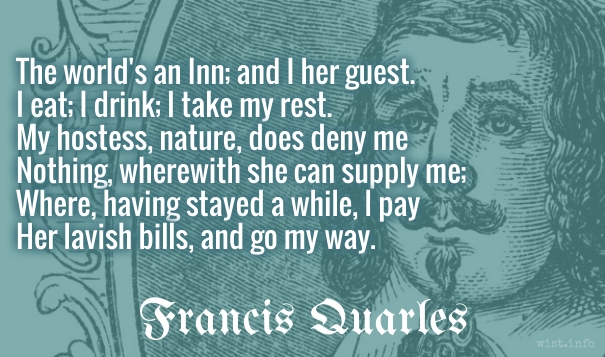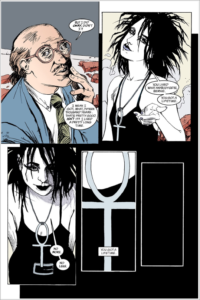And if some god should offer me the privilege of returning to babyhood again, cradle, wailing, and all, I would absolutely refuse. I would have no desire, once my course were run, to be haled back from the race’s end to the starting-line.
[Et si quis deus mihi largiatur ut ex hac aetate repuerascam et in cunis vagiam, valde recusem, nec vero velim quasi decurso spatio ad carceres a calce revocari.]Marcus Tullius Cicero (106-43 BC) Roman orator, statesman, philosopher
De Senectute [Cato Maior; On Old Age], ch. 23 / sec. 83 (23.83) (44 BC) [tr. Copley (1967)]
(Source)
(Source (Latin)). Alternate translations:
And if some god wolde give me puissaunce that I whiche am an olde man myght retourne ayen in to childhode and that I shulde braye and krye in my swathyng cloth and in my cradelle like a childe, I wolde it not but I wolde even refuse it.
[tr. Worcester/Worcester/Scrope (1481)]
I will say more, if God would grant me now in this age to return again to my infancy and to be as young as a child that lieth crying in his cradle, I would refuse and forsake the offer with all my might; neither would I when I have already in a manner run the whole race and own the goal, be again revoked from the end marks to the lists, or place where I took my course at the first setting out. For who would be contented, when he hath gotten the best game, to be forced to race again for the same?
[tr. Newton (1569)]
And if any god would grant me to be now a child in my cradle againe, and to be young, I would refuse it. Neither would I, having runne my full course, be called back again.
[tr. Austin (1648)]
Should some God tell me, that I should be born,
And cry again, his offer I should scorn;
Asham'd when I have ended well my race,
To be led back, to my first starting place.
[tr. Denham (1669)]
And should any of the Gods give me the Liberty of beginning again the Circle of my Years, I should desire to be excused, and be unwilling to begin the Race again, when I am just arrived at the Goal.
[tr. Hemming (1716)]
Or should any heavenly Power grant me the Privilege of turning back, if I pleased, from this Age to Infancy, and to set out again from my Cradle, I would absolutely refuse it; for as I have now got well nigh to the End of my Race, I should be extremely unwilling to be called back, and obliged to start again.
[tr. Logan (1744)]
The sincere truth is, if some divinity would confer upon me a new grant of my life, and replace me once more in the cradle, I would utterly, and without the least hesitation, reject the offer; having well-nigh finished my race, I have no inclination to return to the goal.
[tr. Melmoth (1773)]
But if any god should grant me that I should become a boy again and wail in the cradle, I would strenuously decline it; nor indeed would I wish, as if I had run my course, to be called back from the goal to the starting-post.
[Cornish Bros. ed. (1847)]
For if any god should grant me, that from this period of life I should become a child again and cry in the cradle, I should earnestly refuse it: nor in truth should I like, after having run, as it were, my course, to be called back to the starting-place from the goal.
[tr. Edmonds (1874)]
Indeed, were any god to grant that from my present age I might go back to boyhood, or become a crying child in the cradle, I should steadfastly refuse; nor would I be willing, as from a finished race, to be summoned back from the goal to the starting-point.
[tr. Peabody (1884)]
Nay, if some god should grant me to renew my childhood from my present age and once more to be crying in my cradle, I would firmly refuse; nor should I in truth be willing, after having, as it were, run the full course, to be recalled from the winning-crease to the barriers.
[tr. Shuckburgh (1895)]
Nay, if some God should offer to me now
Once more to be a boy, and shed sad tears
Within my cradle, I'd refuse the gift.
Nor do I wish, my course being fully run,
To leave the winning for the starting post.
[tr. Allison (1916)]
Nay, if some god should give me leave to return to infancy from my old age, to weep once more in my cradle, I should vehemently protest; for, truly, after I have run my race I have no wish to be recalled, as it were, from the goal to the starting-place.
[tr. Falconer (1923)]
Indeed if some god granted me the power to cancel my advanced years and return to boyhood, and wail once more in the cradle, I should firmly refuse. Now that my race is run, I have no desire to be called back from the finish to the starting point!
[tr. Grant (1960; 1971 ed.)]
If I knew that some god had arranged for me to be transformed into an infant bawling in its cradle, I would make a dreadful fuss; once my race was run and I was coming down the final stretch, I would have no desire to be sent all the way back to the starting gate.
[tr. Cobbold (2012)]
And by the same token, if any miracle wouild grant me the chance to be a boy again and to cry in the nursery, I would certainly refuse. There is no way I want to be recalled, as it were, from the finish line to the starting blocks now that I have run the whole race.
[tr. Gerberding (2014)]
And if some god allowed me to get back again
To the cradle, as one of those crying toddlers,
From my ancient age, I’d refuse there and then.
Having run most of my course, I couldn’t face
To be recalled from the finish to the starting place.
[tr. Bozzi (2015)]
Truly, if some god graciously granted that I could put aside my years and start over, crying in my cradle again, I would vehemently refuse. Since I have almost finished my race, why would I want to be called back to the starting line?
[tr. Freeman (2016)]
Even if some god should permit that I would return to the time of my birth from this age, I would sternly refuse -- for, truly, I do not wish to restart as if to retrace a race run from the finish line to the starting post.
[tr. @sentantiq (2018), sec. 84]
Quotations about:
lifetime
Note not all quotations have been tagged, so Search may find additional quotes on this topic.
You think when you wake up in the mornin yesterday dont count. But yesterday is all that does count. What else is there? Your life is made out of the days it’s made out of. Nothin else. You might think you could run away and change your name and I dont know what all. Start over. And then one mornin you wake up and look at the ceilin and guess who’s layin there?
Cormac McCarthy (1933-2023) American novelist, playwright, screenwriter
No Country for Old Men (2005)
(Source)
Death is like thunder in two particulars; we are alarmed at the sound of it; and it is formidable only from that which preceded it.
Charles Caleb "C. C." Colton (1780-1832) English cleric, writer, aphorist
Lacon: Or, Many Things in Few Words, Vol. 2, § 110 (1822)
(Source)
“Maybe,” he said. “Maybe I can get some kind of a happy ending.”
“Not only are there no happy endings,” she told him. “There aren’t even any endings.”
Neil Gaiman (b. 1960) British author, screenwriter, fabulist
American Gods, Part 3, ch. 16 [Shadow and Bast] (2001)
(Source)
I have lived a life. I’ve journeyed through
the course that Fortune charted for me. And now
I pass to the world below, my ghost in all its glory.[Vixi, et, quem dederat cursum Fortuna, peregi;
Et nunc magna mei sub terras ibit Imago.]Virgil (70-19 BC) Roman poet [b. Publius Vergilius Maro; also Vergil]
The Aeneid [Ænē̆is], Book 4, l. 653ff (4.653-654) [Dido] (29-19 BC) [tr. Fagles (2006)]
(Source)
Dido's deathbed statement.
(Source (Latin)). Alternate translations:
I have
Liv'd, and perform'd that course my fortune gave,
And now the earth must my great shade seclude.
[tr. Ogilby (1649)]
My fatal course is finish'd; and I go,
A glorious name, among the ghosts below.
[tr. Dryden (1697)]
I have lived, and finished the race which fortune gave me. And now my ghost shall descent illustrious to the shades below.
[tr. Davidson/Buckley (1854)]
My life is lived, and I have played
The part that Fortune gave,
And now I pass, a queenly shade,
Majestic to the grave.
[tr. Conington (1866)]
I have lived,
And have achieved the course that fortune gave.
And now of me the queenly shade shall pass
Beneath the earth.
[tr. Cranch (1872), l. 855ff]
I have lived and fulfilled Fortune's allotted course; and now shall I go a queenly phantom under the earth.
[tr. Mackail (1885)]
I, I have lived, and down the way fate showed to me have passed;
And now a mighty shade of me shall go beneath the earth!
[tr. Morris (1900)]
My life is lived; behold, the course assigned
By Fortune now is finished, and I go,
A shade majestic, to the world below.
[tr. Taylor (1907), st. 86, l 768ff]
My life is done.
I have accomplished what my lot allowed;
and now my spirit to the world of death
in royal honor goes.
[tr. Williams (1910)]
My life is done and I have finished the course that Fortune gave; and now in majesty my shade shall pass beneath the earth.
[tr. Fairclough (1916)]
I have lived, I have run the course that fortune gave me,
And now my shade, a great one, will be going
Below the earth.
[tr. Humphries (1951)]
I have lived, I have run to finish the course which fortune gave me:
And now, a queenly shade, I shall pass to the world below.
[tr. Day-Lewis (1952)]
I have lived
and journeyed through the course assigned by fortune.
And now my Shade will pass, illustrious,
beneath the earth.
[tr. Mandelbaum (1971), l. 900ff]
I have lived my life out to the very end
And passed the stages Fortune had appointed.
Now my tall shade goes to the under world.
[tr. Fitzgerald (1981), l. 907ff]
I have lived my life and completed the course that Fortune has set before me, and now my great spirit will go beneath the earth.
[tr. West (1990)]
I have lived, and I have completed the course that Fortune granted,
and now my noble spirit will pass beneath the earth.
[tr. Kline (2002)]
I have lived, and I have completed the course
Assigned by Fortune. Now my mighty ghost
Goes beneath the earth.
[tr. Lombardo (2005)]
I'm done with life; I've run the course Fate gave me.br> Now my noble ghost goes to the Underworld.
[tr. Bartsch (2021)]
In any man who dies there dies with him,
his first snow and kiss and fight.[И если умирает человек,
с ним умирает первый его снег,
и первый поцелуй, и первый бой…]Yevgeny Yevtushenko (1933-2017) Russian poet, writer, film director, academic [Евге́ний Евтуше́нко, Evgenij Evtušenko]
“People” (1961), l. 12ff, Selected Poems (1962)
(Source)
JAQUES: [O]ne man in his time plays many parts,
His acts being seven ages. At first the infant,
Mewling and puking in the nurse’s arms.
Then the whining schoolboy with his satchel
And shining morning face, creeping like snail
Unwillingly to school. And then the lover,
Sighing like furnace, with a woeful ballad
Made to his mistress’ eyebrow. Then a soldier,
Full of strange oaths and bearded like the pard,
Jealous in honor, sudden and quick in quarrel,
Seeking the bubble reputation
Even in the cannon’s mouth. And then the justice,
In fair round belly with good capon lined,
With eyes severe and beard of formal cut,
Full of wise saws and modern instances;
And so he plays his part. The sixth age shifts
Into the lean and slippered pantaloon
With spectacles on nose and pouch on side,
His youthful hose, well saved, a world too wide
For his shrunk shank, and his big manly voice,
Turning again toward childish treble, pipes
And whistles in his sound. Last scene of all,
That ends this strange eventful history,
Is second childishness and mere oblivion,
Sans teeth, sans eyes, sans taste, sans everything.William Shakespeare (1564-1616) English dramatist and poet
As You Like It, Act 2, sc. 7, l. 149ff (2.7.149-173) (1599)
(Source)
Aristotle says that on the banks of the River Hypanis, which falls into the Euxine from a part of Europe, there is an order of beasties (creatures, insects, bestiolæ), which live one day. Of these, therefore, any that dies at the eight hour has died at an advanced age, but any that dies at sunset, in positive senility, especially if it be the solstice. Compare, now, our longest life with eternity, and we shall be found to be in much the same category as these ephemerals.
[Apud Hypanim fluvium, qui ab Europae parte in Pontum influit, Aristoteles ait bestiolas quasdam nasci, quae unum diem vivant. Ex his igitur hora VIII quae mortua est, provecta aetate mortua est; quae vero occidente sole, decrepita, eo magis, si etiam solstitiali die. Confer nostram longissimam aetatem cum aeternitate: in eadem propemodum brevitate qua illae bestiolae reperiemur.]
Marcus Tullius Cicero (106-43 BC) Roman orator, statesman, philosopher
Tusculan Disputations [Tusculanae Disputationes], Book 1, ch. 39 (1.39) / sec. 94 (45 BC) [tr. Black (1889)]
(Source)
The reference is to Aristotle, History of Animals, 5.19 (552b.18). (Source (Latin)). Alternate translations:
By the mouth of the Hypanis, which on the side of Europe, falleth into the Black Sea; Aristotle reports certain Insects to be bred, that live but one day. Such therefore, of these, as dye at two in the Afternoon, dye elderly; but such, as at Sunset, very aged; and the more, if it be on the longest day in Summer. Compare our life, at longest, with Eternity; we shall be found, in a manner, as short-liv'd as are these Insects.
[tr. Wase (1643)]
Aristotle saith, there is a kind of insect, near the river Hypanis;, which runs from a certain part of Europe, into the Pontus, whose life consists but of one day; those that die at the eighth hour, die in full age; those who die when the sun sets, very old, especially when the days are at the longest. Compare our l9ongest age with eternity, and we shall be found as short-lived as those little animals.
[tr. Main (1824)]
At the river Hypanis, which flows into the Euxine, from a part of Europe, certain little insects, Aristotle says, are born to live but a day. Then, one of these, that dies at two afternoon, dies well-advanced in life; but he that dies at sunset, especially about the summer solstice, decrepit. Compare our longest age with eternity; we shall be found in much the same brevity with these little insects.
[tr. Otis (1839)]
On the River Hypanis, which flows from some part of Europe into the Euxine Sea, Aristotle says that there is a certain species of insects that live only a day. One of them that died at the eighth hour of the day would have died at an advanced age; one of them that died at sunset, especially at the summer solstice, would have been decrepit. If we compare our life with eternity, we shall find ourselves of almost as brief a being as those insects.
[tr. Peabody (1886)]
By the river Hypanis which flows into the Black Sea on the European side, Aristotle says some tiny creatures are born which live for one day. So of these one which has died in the eight hour has died at an advanced age; one which has died at sunset is senile, all the more if it dies at the summer solstice. Compare the longest human life with eternity; we shall turn out to be almost as short-lived as these tiny creatures.
[tr. Douglas (1985)]
Aristotle reports that along the river Hypanis, which flows into Pontus from Europe, tiny creatures are born that live but a single day. If they die at the eighth hour they're of an advanced age, if at sunset, they're decrepit -- even more so on the solstice. Measure the longest human lifespan against eternity: you'll find we live about as briefly as those little creatures do.
[tr. Habinek (1996)]
On the river Hypanis which flows from part of Europe into the Black Sea, Aristotle says that little creates are born which live for a single day. One of them, therefore, that has died at the eighth hour of the day has died at an advanced age; one that has died at sunset is senile, and all the more so if this occurs at the summer solstice. Compare our longest lifetime with eternity: we shall be found to be virtually as short-lived as those little creatures.
[tr. Davie (2017)]
Aristotle says that certain little beasts which live for only one day are born near the Hypanis, which flows from part of Europe into the Black Sea. One of these who dies at sunrise dies as a youth; one who dies at noon has already achieved an advanced age; but one who departs at the setting of the sun dies old, especially if it is the solstice. Compare the entirety of our life with eternity, and we will be found to exist for just as short a time as that animal.
[tr. @sentantiq (2019), quoting from Petrarch, Secretum 3.17]
How many a man has dated a new era in his life from the reading of a book.
Henry David Thoreau (1817-1862) American philosopher and writer
Walden, ch. 1 “Reading” (1854)
(Source)
The world’s an Inn; and I her guest.
I eat; I drink; I take my rest.
My hostess, nature, does deny me
Nothing, wherewith she can supply me;
Where, having stayed a while, I pay
Her lavish bills, and go my way.
No one can understand history without continually relating the long periods which are constantly mentioned to the experiences of our own short lives. Five years is a lot. Twenty years is the horizon to most people. Fifty years is antiquity. To understand how the impact of destiny fell upon any generation of men one must first imagine their position and then apply the time-scale of our own lives.
BERNIE: But I did okay, didn’t I? I mean I got, what, fifteen thousand years. That’s pretty good, isn’t it? I lived a pretty long time.
DEATH: You lived what anybody gets, Bernie. You got a lifetime. No more. No less. You got a lifetime.
Neil Gaiman (b. 1960) British author, screenwriter, fabulist
Sandman, Book 7. Brief Lives, # 43 “Part 3” (1992-11)
(Source)
“I wish life was not so short,” he thought. “Languages take such a time, and so do all the things one wants to know about.”
J.R.R. Tolkien (1892-1973) English writer, fabulist, philologist, academic [John Ronald Reuel Tolkien]
The Lost Road, ch. 1 [Alboin] (1987) [ed. C. Tolkien]
(Source)
“I wish it need not have happened in my time,” said Frodo.
“So do I,” said Gandalf, “and so do all who live to see such times. But that is not for them to decide. All we have to decide is what to do with the time that is given us.”
J.R.R. Tolkien (1892-1973) English writer, fabulist, philologist, academic [John Ronald Reuel Tolkien]
The Lord of the Rings, Vol. 1: The Fellowship of the Ring, Book 1, ch. 2 “The Shadow of the Past” (1954)
(Source)



















